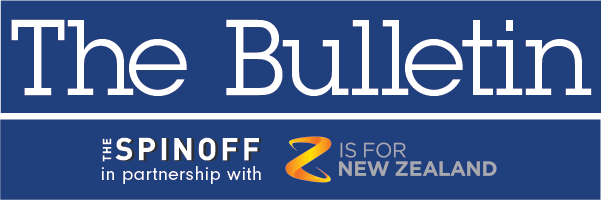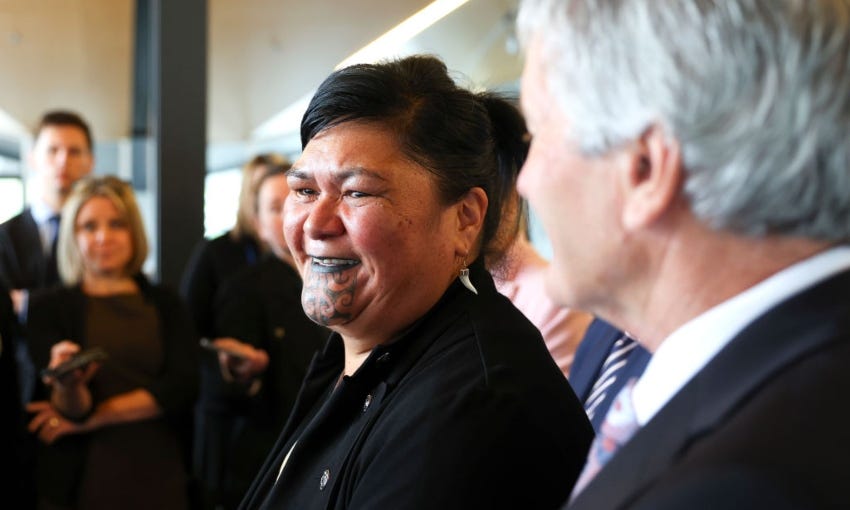Mahuta moves away from Five Eyes in major speech
The upcoming visit of the Australian foreign minister could be a bit tense
Good morning and welcome to The Bulletin for Tuesday 20 April, by Alex Braae for The Spinoff. Presented in partnership with Z Energy.
In today’s edition: Mahuta moves away from Five Eyes in major speech, new research shows raised risk of Alpine fault quake, and trans-Tasman bubble opens on emotional day.
Image: Foreign minister Nanaia Mahuta (Getty Images)
Foreign minister Nanaia Mahuta has sought to continue a 'best of both worlds' approach to the growing divide between China and US-led nations. The speech, made at the New Zealand China Council, comes at a time of significant difference between this country and Australia over how to deal with China. And as such, it'll be closely watched by other Five Eyes countries. Our political editor Justin Giovannetti was there, and made the following assessments:
Did Mahuta speak at all to specific human rights abuses, or were there any more generalised statements?
Giovannetti: This was probably Nanaia Mahuta's most significant policy speech yet. She compared China and New Zealand's relationship to that of the dragon and the taniwha. It was a bit of a dense metaphor. In this case, the taniwha was very reserved to speak about the dragon's human rights abuses. She said the government reserves the right to speak publicly about what she called "the developments in Hong Kong," the treatment of the Uyghurs and "cyber incidents" but didn't actually deliver any criticism yesterday.
How much did her comments contrast with those of trade minister Damian O'Connor recently, in which he said Australia should "follow us and show respect" to China?
Where O'Connor was blunt, Mahuta was trying to keep her head down--but the message wasn't all that different. She wanted to tell New Zealand's security partners, Australia and the U.S., that we are willing to criticise China, but we'll do it privately. And she promised China, our main economic partner, that we'll be a respectful, predictable and consistent friend. So no need to worry about New Zealand. Show respect, was basically O'Connor's terribly delivered message and she echoed it.
Australian trade has been heavily punished by China in recent months. And looking ahead to the visit of Australian FM Marrisa Payne, does it suggest any movement towards their position?
None. I asked Mahuta after her speech about the inherent contradiction in New Zealand’s foreign policy: Our friends want us to criticise China, while China holds a lot of economic cards and won't put up with any criticism from us. Instead of answering directly, she spoke about how the Five Eyes intelligence alliance hasn't been used correctly by the other four members. They’ve put out statements on its letterhead to criticise China. It's beyond the alliance's remit and she won't sign New Zealand up for it. It was strong, unequivocal language and got me thinking for the first time that the Five Eyes might look to shrink to four.
A few other pieces about the speech that are worth reading: Newsroom's Sam Sachdeva picked up on how it wasn't a complete embrace of China, with warnings made that the New Zealand economy needed to remain diverse. Waikato University international relations professor Al Gillespie wrote on The Conversation about how other democracies are moving on with new alliance formations, without including New Zealand. And on Politik, Richard Harman writes about how significant a break it represents away from the positions of former FM Winston Peters.
New research shows the risk of a major earthquake up the Alpine fault is much higher than previously thought. Writing on The Spinoff, Ursula Cochran and lead researcher Jamie Howarth explain how the findings were made, and what they mean for our understanding of the risks of the South Island getting hit hard. Does that mean communities in the area are screwed? Not necessarily – "when this earthquake happens, damage will be inevitable – but disaster is avoidable," say the authors.
The trans-Tasman bubble opened yesterday to fanfare and family reunions. Our live updates editor Stewart Sowman-Lund was sent out on assignment to the airport, where he saw astonishing sights, like a live band playing nothing but Dave Dobbyn's Welcome Home for an hour straight. Thousands of people are understood to have taken a flight yesterday, and many more will be doing the same in the coming weeks, providing the so-far smooth operation continues.
And on our Australia Week coverage: Alice Neville offers a definitive ruling on which country owns what food. And Calum Henderson looks back at the high level cultural summit between the two countries that happened in 2016, when Chris Warner met Alf Stewart.
The Spinoff can’t exist without our members. If you want to help us stay curious and keep our team across New Zealand’s breaking stories, please donate today.
Keep an eye out for this story later in the morning: The Exclusive Brethren has allegedly been using spy firm Thompson and Clark to snoop on former members, reports Radio NZ. The church has reportedly become a major client of the firm, since it was blacklisted after being busted spying on Greenpeace members on behalf of government departments. At the time of writing, the article wasn't published on the website, but there will likely be follow-ups. The church has denied the allegations.
Some migrant workers in New Zealand will be reunited with their families, but thousands more will miss out. Newshub's Tova O'Brien reports that a change in the rules hasn't applied to those who fall outside three specific categories. They are: families offshore who had visas but didn't make it in time, those earning $107k in specialist jobs, and critical health workers. As the Indian Weekender reports, getting those eligible families in could still take months, because of a lack of space in MIQ.
Serious concerns are being raised about elderly people being discharged from hospital during the night, or in the early hours of the morning. Daisy Hudson reports for the ODT that Grey Power have been warning that such discharges have been taking place for years, and are disgusted to see them still happening. The issue was put on the agenda by National, who released figures showing in January 11 overnight discharges were made by the Southern DHB of people over the age of 80.
A bit more feedback on the concept of prohibition, relating to the wider debate about smoking and restrictions on personal freedom for the greater good: Tim wrote in to make the point that the success or failure of prohibition all depends on how you define it, and actually prohibition succeeded in doing what it set out to do, even if there were unintended consequences. To quote:
The one thing I'd add is that prohibition in fact was a success - levels of alcohol consumption fell rapidly during the prohibition, and a significant portion of that fall was permanent, enduring post-prohibition. We forget just how much of a scourge alcohol was in the 19th century. In particular, alcohol related violent crime fell enormously during prohibition, a stat which doesn't measure any fall in domestic violence rates, which is also assumed to have happened.
The popular image of prohibition as a source of organised crime is largely explained by other factors, I.e. urbanisation and the depression. And our conception of it as toothless and easily circumvented largely describes the situation of urban dwelling elites, rather than the population (especially the rural population) at large.
Got some feedback about The Bulletin, or anything in the news?
Drop us a line at thebulletin@thespinoff.co.nz
Right now on The Spinoff: Leonie Hayden laments the way new TV drama Vegas reinforces old stereotypes about who Māori are. Liam Rātana writes about how jobseekers can make the most of flexibility on the part of prospective employers. Mirjam Guesgen looks at how far we are willing to go with brain-controlled devices. Sapeer Mayron of the Samoa Observer writes about Fiame Naomi Mata’afa, the MP with a chance of becoming the next PM of Sāmoa. Chris Schulz writes about a secret free parking spot in the middle of Auckland, and the battles those in the know have to keep it that way. And Linda Burgess reviews new comedy Creamerie in very favourable terms.
For a feature today, an analysis of the role played by a particular Aussie business column for distributing information that maybe shouldn't be in the public domain. Writing on Business Desk (paywalled) editor Pattrick Smellie has discussed Street Talk, the AFR gossip column that frequently breaks stories with immense relevance to NZX-listed companies. That's partly down to good journalism – but also partly down to tactical leaking, in a way that may not be entirely within the codes of financial markets. Here's an excerpt:
If the volume of accurate leaks to Street Talk is anything to go by, it appears either that Australian regulators are either inured to the practice, unable to stop it, unwilling to tackle it, or tacitly allowing it to continue.
However, as the Australian and NZ equities markets come to have more and more commonly listed stocks, and particularly as the ASX seeks increasingly to play in the NZ pond for new listings, it is reasonable for NZ authorities to start insisting on adherence to rules that are intended to prevent some shareholders trading on information that others don’t have.
In sport, proposals for the richest football clubs in Europe to form a breakaway super-league are gathering momentum. Personally, I think the idea of it is a disgrace, but I found it hard to articulate why until reading this excellent analysis from the Guardian's Jonathan Liew. He argues that the proposals effectively represent a hatred of fair competition and level playing fields – already a problem for the sport – but one that would be exacerbated by such a move. European governing body UEFA has gone NATO on it all – the Independent reports there are now plans afoot to kick participating clubs out of the Champions League with immediate effect, and ban their players from the upcoming World Cup.
That's it for The Bulletin. If you want to support the work we do at The Spinoff, please check out our membership programme.







